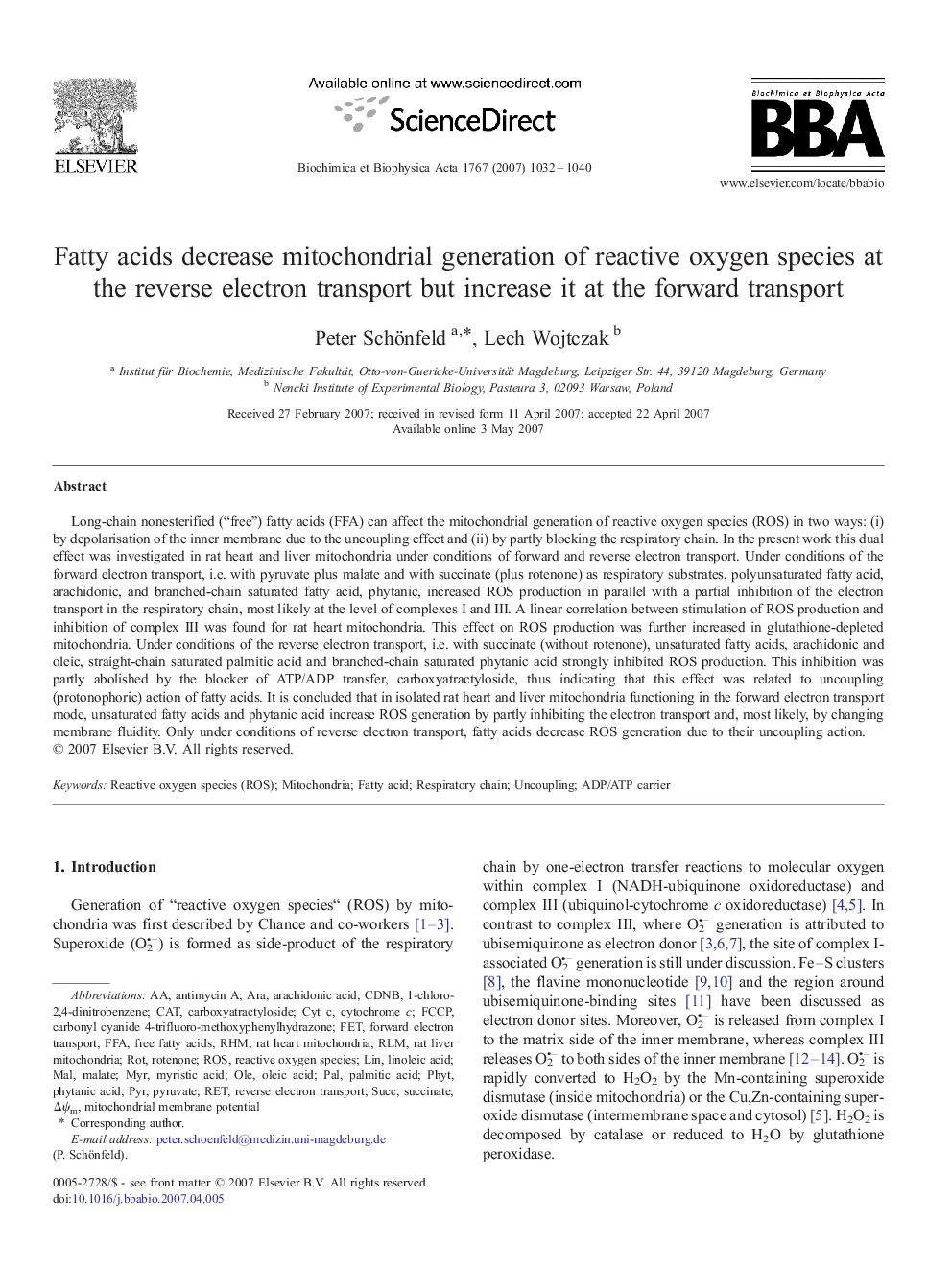| کد مقاله | کد نشریه | سال انتشار | مقاله انگلیسی | نسخه تمام متن |
|---|---|---|---|---|
| 10796055 | 1052673 | 2007 | 9 صفحه PDF | دانلود رایگان |
عنوان انگلیسی مقاله ISI
Fatty acids decrease mitochondrial generation of reactive oxygen species at the reverse electron transport but increase it at the forward transport
دانلود مقاله + سفارش ترجمه
دانلود مقاله ISI انگلیسی
رایگان برای ایرانیان
کلمات کلیدی
CATCDNBFETMALFFAFCCPPALΔΨmCyt COLEphytantimycin APYRRHMRLMSuccCarboxyatractyloside1-chloro-2,4-dinitrobenzene - 1-کلرو-2،4-دینیتروبنزنROS - ROSArachidonic acid - اسید آراشیدونیکOleic acid - اسید اولئیکPhytanic acid - اسید فیتانیکLinoleic acid - اسید لینولئیکMyristic acid - اسید مریستیکFatty acid - اسید چربFree fatty acids - اسیدهای چرب آِزادuncoupling - جدا کردنADP/ATP carrier - حامل ADP / ATPRET - حقARA - در حال حاضرRot - روتRotenone - روتنونRespiratory chain - زنجیر تنفسیSuccinate - سوکینتینcytochrome c - سیتوکروم سیLin - لینmalate - مالتreverse electron transport - معکوس حمل و نقل الکترونRat heart mitochondria - میتوکندری قلب موشRat liver mitochondria - میتوکندری کبدی موشMitochondria - میتوکندریاMyr - میرPalmitic acid - پالمیتیک اسیدMitochondrial membrane potential - پتانسیل غشای میتوکندریPyruvate - پیرواتReactive oxygen species (ROS) - گونه های اکسیژن واکنشی (ROS)Reactive oxygen species - گونههای فعال اکسیژن
موضوعات مرتبط
علوم زیستی و بیوفناوری
علوم کشاورزی و بیولوژیک
دانش گیاه شناسی
پیش نمایش صفحه اول مقاله

چکیده انگلیسی
Long-chain nonesterified (“free”) fatty acids (FFA) can affect the mitochondrial generation of reactive oxygen species (ROS) in two ways: (i) by depolarisation of the inner membrane due to the uncoupling effect and (ii) by partly blocking the respiratory chain. In the present work this dual effect was investigated in rat heart and liver mitochondria under conditions of forward and reverse electron transport. Under conditions of the forward electron transport, i.e. with pyruvate plus malate and with succinate (plus rotenone) as respiratory substrates, polyunsaturated fatty acid, arachidonic, and branched-chain saturated fatty acid, phytanic, increased ROS production in parallel with a partial inhibition of the electron transport in the respiratory chain, most likely at the level of complexes I and III. A linear correlation between stimulation of ROS production and inhibition of complex III was found for rat heart mitochondria. This effect on ROS production was further increased in glutathione-depleted mitochondria. Under conditions of the reverse electron transport, i.e. with succinate (without rotenone), unsaturated fatty acids, arachidonic and oleic, straight-chain saturated palmitic acid and branched-chain saturated phytanic acid strongly inhibited ROS production. This inhibition was partly abolished by the blocker of ATP/ADP transfer, carboxyatractyloside, thus indicating that this effect was related to uncoupling (protonophoric) action of fatty acids. It is concluded that in isolated rat heart and liver mitochondria functioning in the forward electron transport mode, unsaturated fatty acids and phytanic acid increase ROS generation by partly inhibiting the electron transport and, most likely, by changing membrane fluidity. Only under conditions of reverse electron transport, fatty acids decrease ROS generation due to their uncoupling action.
ناشر
Database: Elsevier - ScienceDirect (ساینس دایرکت)
Journal: Biochimica et Biophysica Acta (BBA) - Bioenergetics - Volume 1767, Issue 8, August 2007, Pages 1032-1040
Journal: Biochimica et Biophysica Acta (BBA) - Bioenergetics - Volume 1767, Issue 8, August 2007, Pages 1032-1040
نویسندگان
Peter Schönfeld, Lech Wojtczak,